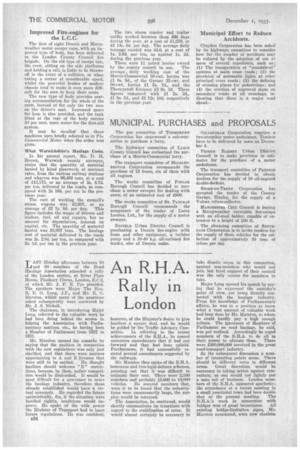An R.H.A.
Page 42

If you've noticed an error in this article please click here to report it so we can fix it.
Rally in London
LA31Monday afternoon between 70 and 80 members of the Road Haulage Association attended a rally of the London section, at River Plate House, Finsbury Circus, London, E.C.2, at which Mr. J. F. E. Pye presided. The speakers were Major The Hon.
R. E. 0. Long, and Mr. E. C. Marston, whilst many of the questions asked subsequently were answered by Mr. J. 8.
The chairman, in introducing Major Long, referred to the valuable work he had been doing behind the scenes in helping the Association with Parliamentary matters, etc., he having been a Member of Parliament from 1927 to 1931.
Mr. Marston. opened his remarks by saying that the position in connection with the new regulations was only just clarified, and that there were matters appertaining to A and B licences that
were still to be settled. He thought hauliers should welcome 'I B" restrictions, because, by them, unfair competition would be diminished. It weuld be most difficult for a newcomer to enter the haulage industry, therefore those already established would have a virtual monopoly. Ile regarded the future optimistically, for, if the situation were handled rightly, conditions would improve. He spoke of the wide power the Minister of Transport had to issue future regulations. He was confident,
however, of the Minister's desire to give hauliers a square deal, and he would be guided by the Traffic Advisory Committee. In referring to the recent achievements of the R.H.A., he named numerous amendments that it had put forward and that had been upheld. Furthermore, it had successfully resisted several amendments suggested by the railways.
Mr. Marston then spoke of the R.H.A. insurance and free-legal-defence-schemes, pointing out that it was difficult to estimate their cost. There were 2,500 me-mbers and probably 15,000 to 16,000
vehicles. He assured members that, were it to he found that the subscriptions were unnecessarily large, the surplus would be returned.
The Association, he continued, would shortly communicate its intentions with regard to the stabilization of rates. It would almost certainly he necessary to take drastic steps, in this connection, against non-members who would not join, but loyal support of their council was the only course for members to take.
Major Long opened his speech by saying that he expressed the outsider's point of view, not being directly connected with the haulage industry. From his knowledge of Parliamentary affairs, he was in a position to know what a vast amount of valuable work had been done by Mr. Marston, to whom he could hardly pay a high enough tribute. The ignorance of Members of Parliament on road haulage, he said, was pot realized. Accordingly he urged members of the R.H.A. to do all in their power to educate them. There were £300,000,000 involved in the great road-transport industry.
1.ti the subsequent discussion a number of interesting points arose. There should be different rates in different areas. Great di.seretion would be necessary in taking action against ratecutters, as one would not lightly put a man out of business. London members of the R.H.A. appeared apathetic; the attendance at a recent meeting in a small provincial town had been double that at the present meeting. The R.H.A.'s work in connection with bridges was of great importance. All existing bridge-limitation signs, Mr. Marston announced, were now obsolete.




































































































